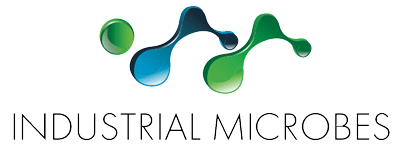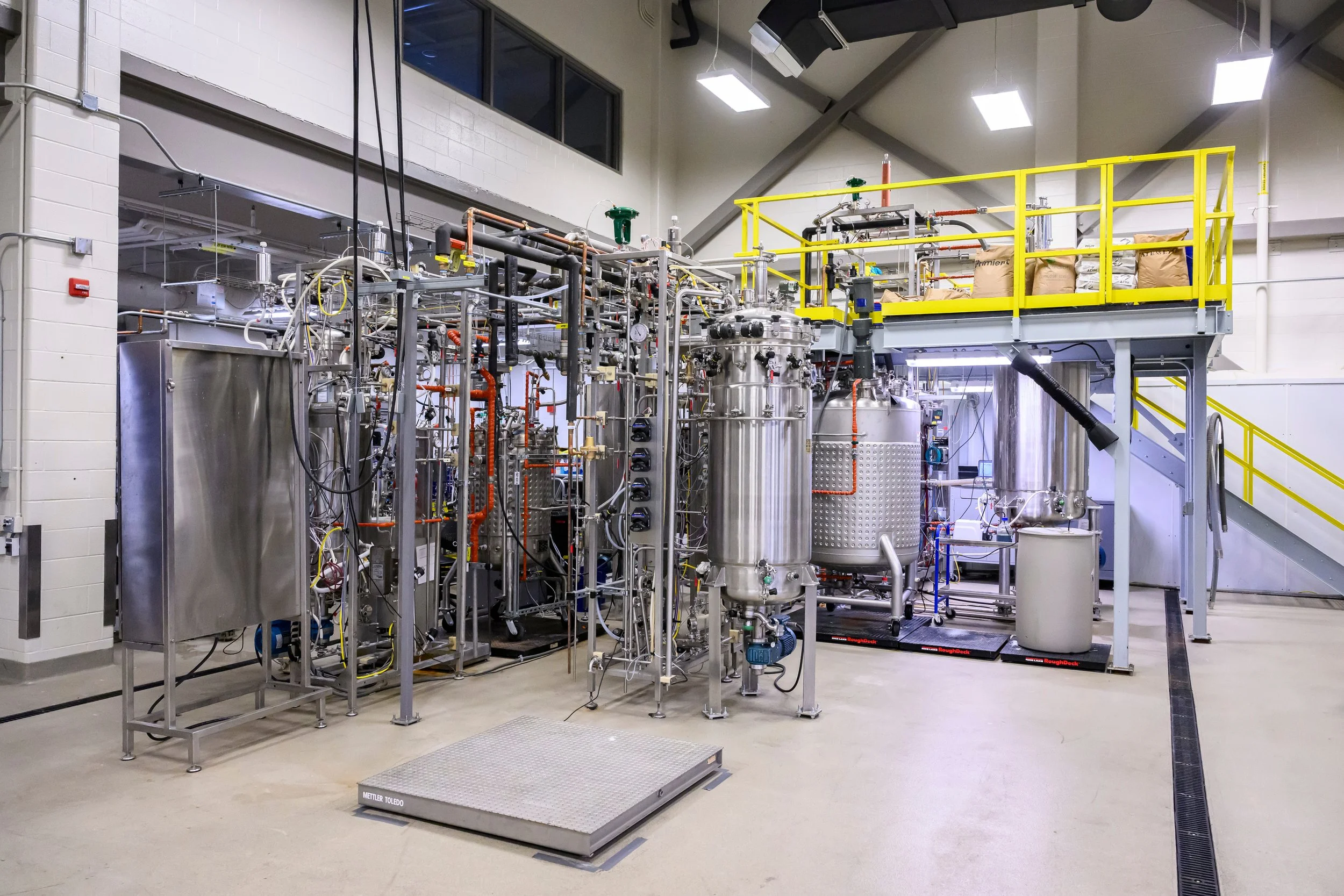iFAB Tech Hub grows net-zero industrial chemical partnerships with iMicrobes, champions bioeconomy.
Originally published in ACES News on Aug 14
In the wake of the $51 million funding announcement from the Economic Development Administration, momentum is tangible for the Illinois Fermentation and Agriculture Biomanufacturing (iFAB) Tech Hub. Today marks the beginning of a new collaboration to replace fossil fuel-derived petrochemicals with zero-emission alternatives produced through precision fermentation.
From left: Hana Ostrander, IBRL junior pilot plant specialist, and Amanda Beverly, director of fermentation for iMicrobes.
Industrial Microbes is partnering with the iFAB Tech Hub’s Integrated Bioprocessing Research Laboratory (IBRL) at the University of Illinois Urbana-Champaign to harness microbes to produce acrylic acid, a versatile chemical compound that is fundamental in the production of a wide range of products across various industries.
Today, they began their first pilot-scale test run at IBRL to demonstrate scalability and produce larger samples of biobased acrylic acid. This project is supported by BioMADE to as it works to help create and domestically source the manufactured goods that people use every day.
The global acrylic acid market is expected to hit almost 15 billion dollars by 2030. Companies like iMicrobes, looking to offer a biobased alternative, can scale their biomanufacturing technologies right here in Central Illinois, said Beth Conerty who leads the iFAB consortium and IBRL business development within the College of Agricultural, Consumer and Environmental Sciences.
“With the support of the landmark EDA grant, iFAB is building a robust biomanufacturing ecosystem across Central Illinois that empowers companies to bring their bioinnovations from the laboratory to full-scale production,” Conerty said.
“Our goal is to make Central Illinois the go-to destination for enterprises turning scientific advancements into real-world, eco-friendly solutions that redefine industrial chemistry.”
iMicrobes President Derek Greenfield said they aim to replace the manufacturing industry’s ubiquitous petroleum-derived chemicals with a bio-based, net-zero acrylic acid for the burgeoning bioeconomy.
Acrylic acid is used to produce things like greener diapers and period products, durable bioplastics, fabrics, water treatment chemicals, adhesives, sealants, paints — and much more.
"Through the power of synthetic biology, we've programmed microorganisms to harness a variety of renewable feedstocks like ethanol, carbon dioxide, and methane, moving away from petroleum-based processes,” said iMicrobes CTO Liz Clarke.
Greenfield added
“We’ve focused on designing a process with net-zero emissions that is producing a drop-in, low-cost, biobased replacement for acrylic acid that mirrors its conventional counterpart."
Other groups are partnering with the IBRL to leverage precision fermentation in the production of other universal industrial chemicals: the Center for Advanced Bioenergy and Bioproducts Innovation is generating a precursor to acrylic acid, 3HP, while BioMADE is supporting additional research has funded a project for producing succinic acid, which is used in biodegradable plastics, synthesizing pharmaceuticals, enhancing flavors in food and beverages, maintaining the quality of cosmetics, and more.
"As we look to the future, iFAB is not just fostering innovation; we are actively inviting businesses and entrepreneurs to join us in Central Illinois, the emerging epicenter of sustainable biomanufacturing,” Conerty said.
“Our facilities, resources, and expertise are geared towards transforming bold ideas into market-ready solutions that lead the way in environmental stewardship and economic growth. Together, we can redefine the landscape of industrial manufacturing, making it greener, more efficient, and infinitely more sustainable."
About iFAB
The Illinois Fermentation and Agriculture Biomanufacturing (iFAB) Tech Hub is poised to become the global leader in precision fermentation and biomanufacturing — an industry expected to grow to $200 billion over the next 15 years. Leveraging biology as a manufacturing technology of the future, iFAB is uniquely uniting world-class R&D, industry leaders, innovative startups, scalable infrastructure, abundant feedstock production, unparalleled transportation networks, and strong relationships with corn and soybean suppliers within a 51-mile radius. This unique lab-to-line approach establishes the iFAB region (Champaign, Piatt, and Macon counties) as the preeminent destination for the biomanufacturing industry.
About ACES
The College of Agricultural, Consumer and Environmental Sciences (ACES) at the University of Illinois Urbana-Champaign stands at the forefront of innovation and impact through cutting-edge research, transformative education, and collaborative outreach. Home to Illinois Extension, including 4-H, we are catalysts for economic and community development in Illinois and beyond. Our top-ranked academic programs, designed to foster global leadership and scholarly excellence, empower the next generation of leaders to shape a more sustainable and equitable future. Together, we champion robust food systems, nurture thriving families and communities, and steward a healthy planet



